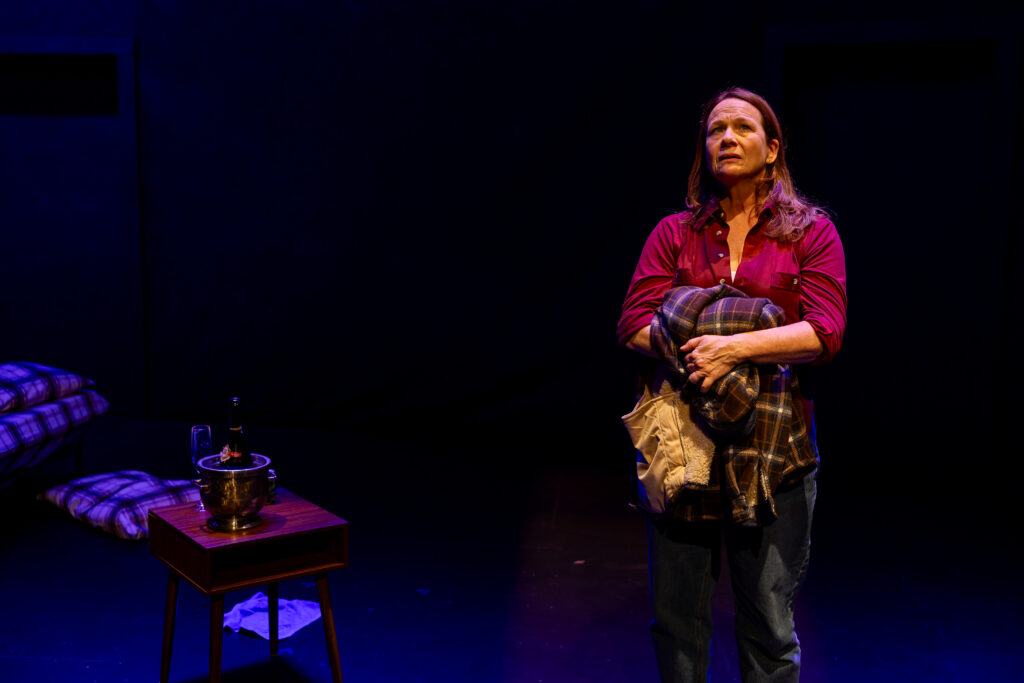
(Photo Credit: Nile Scott Studios)
‘How I Learned to Drive’ — Written by Paula Vogel. Directed by Elaine Vaan Hogue. Scenic Design by Baron E. Pugh; Lighting Design by Marcella Barbeau; Costume Design by Marissa Wolf; Sound Design by Mackenzie Adamick. Presented by Actors’ Shakespeare Project at the Roberts Studio Theatre, Calderwood Pavilion, 527 Tremont St., Boston through November 25.
By Shelley A. Sackett
“You and Driver Education — Safety First,” a voice announces as the lights dim. A middle-aged woman steps onto a bare set, composing herself. She turns to face the audience, addressing them as though mid-conversation.
“Sometimes, to tell a secret, you first have to teach a lesson,” she says. “We’re going to start our lesson tonight on an early, warm summer evening.”
So begins Paula Vogel’s brilliant Pulitzer Prize Award-winning play, “How I Learned to Drive,” in which she examines the complicated ways in which we process the trauma, shame, and blame associated with pedophilia and family complicity. If the topic sounds heart-wrenching and heavy, that’s because it is.
Yet, thanks to superb acting, Elaine Vaan Hogue’s sensitive direction, and Vogel’s candid and non-judgmental script, we grow to care about the characters — all of them, including the predator, Uncle Peck. Although a testament to Vogel’s ability to create a defective character whose humanness prevents us from dismissing him as pure evil, that is perhaps the most disturbing part of the play.
Set in Maryland in the 1960s and ‘70s, the non-chronological scenes are narrated by Li’l Bit (the spectacular Jennifer Rohn), a woman now in her mid-30s who plumbs her memories of the sexual assault she endured beginning at age 11 and continuing until her 18th birthday. The abuse began as a driving lesson, and Vogel uses titles from a guide to a driving handbook as a device to link the nonlinear episodes.

As “Drive” moves back in time, from when Li’l Bit was 17 to 15 to 13 and, finally, 11, the horror and helplessness of the situation hangs heavy. Endowed from a young age with very large breasts, Li’l Bit is ridiculed and bullied at school and at home. Only Uncle Peck (an equally amazing Dennis Trainor, Jr.), whose playful, empathetic, and supportive relationship is a welcome refuge for the isolated and lonely child/woman, seems to understand and care about her. Their relationship forms the backbone of the play.
We watch as Uncle Peck systematically grooms and desensitizes Li’l Bit, nefariously making her his accomplice instead of his victim. “Have I forced you to do anything?” he asks repeatedly as he unlatches her bra with one hand, joking about how boys her own age probably fumble and need her assistance to accomplish the same feat. “Nothing is going to happen between us until you want it to,” he croons. “You just can’t tell anyone.”
Interspersed between the edgy scenes of seduction are narration and a Greek chorus of three (Amy Griffin, Sarah Newhouse, and Tommy Vines, all superb) who deliver monologues and play many roles in family scenes, driving lessons, restaurants, and the schoolyard. In one scene, our hearts ache for 11-year-old Li’l Bit as her family (mother, aunt Mary, Uncle Peck, cousin BB, Grandma and Grandpa) shrieks derisively as they joke about her breasts. No wonder she takes refuge in the kitchen with Uncle Peck as he washes the dishes and converses with her as if she were his peer.
Their weekly driving lessons start shortly after.
As Li’l Bit plumbs her memory, revealing and reliving episodes of these driving lessons and submission to the accompanying sexual abuse, she also reveals how the years of trauma finally caught up with her, leading to her drinking to excess and getting expelled from college. She relives other memories, too, some so painful she can’t deal with them and, continuing the driving metaphor, changes them “like changing stations on the radio.”
Vogel expertly uses humor and slapstick to lighten the emotional load of the unrelenting manipulation and abuse. “A Mother’s Guide to Social Drinking” and “On Men, Sex and Woman” feature bravura performances by Newhouse as Li’l Bit’s mother and make their points while making the audience laugh.
Vogel turns to a monologue by Aunt Mary (also Newhouse) to answer the question of whether Li’l Bit’s family knew what was going on.

Turns out, they did.
Alone on stage, Aunt Mary defends her husband, claiming he is the victim of Li’l Bit’s manipulation. She can’t wait for Li’l Bit to go off to college, so things can go back to normal. “I’m a very patient woman,” she states with more than a whiff of menace. ”But I’d like my husband back.”
Even more chilling, if that is possible, is the scene titled, “Uncle Peck Teaches Cousin Bobby How to Fish,” during which it becomes clear that Uncle Peck also assaulted his young nephew BB after baiting and trapping him with the same kindness, gifts and you-can-trust-me-banter he used on his niece. The ruthless and deliberate nature of the premeditated attack, stripped naked of the frisky banter of his encounters with Li’l Bit, unmasks Uncle Peck for the cold-blooded pedophile he is.
Eventually, Li’l Bit breaks free of Uncle Peck on her 18th birthday in a pivotal scene where Uncle Peck exposes how unhinged he has become, and Li’l Bit finally leaves him and their situation for good. The trouble is, the years of trauma have etched an indelible toll on her, one that leaves her reflecting on why Uncle Peck molested her and what responsibility she bears. She ruefully wonders whether she will ever be able to forgive Uncle Peck and, by extension, herself.
As Li’l Bit and Uncle Peck, Rohn and Trainor are spot-on perfection. Trainor captures Uncle Peck’s crushed spirit and underlying aw-shucks grace, his tortured yet thoughtful self. Rohn brings an incandescence to the complex Li’l Bit and the chasms separating her bone-weary adult sadness and giddy little girl appreciation for adult attention and admiration. It is a fine line, and Rohn navigates it effortlessly. A set bare of all but a few chairs, tables, and a bed places the focus squarely where it should be: on the characters.
At the end of the play, Vogel’s script returns to the present. Li’l Bit thinks about her next steps now that she is 35. “That’s getting up there for a woman. I find myself believing in things that a younger self vowed never to believe in. Things like family and forgiveness,” she says.

Despite everything she has been through and the fact that it all began with her sitting in the driver’s seat, she is grateful for the freedom she feels when she drives, the nearest sensation she can muster of “flight in the body.”
As she sits alone in her car, adjusting her rear view mirror, she notices Uncle Peck sitting in the back. After smiling at him, she steps on the gas pedal and drives away.
Although first produced in 1997, it wasn’t until 2020 that Vogel first spoke about the play as autobiographical. “I didn’t go into this concerned with the forgiveness of that person [Peck is based on]. I went into this concerned with the forgiveness of myself. Because the truth is the children always feel culpable. And the structure of this is me getting to a point where I’m like, ‘You know what? You were a kid. That’s all I wanted, to get there and feel that. And to have it be such a basic truth that my childhood self would accept it,” Vogel said in an earlier interview. For information and tickets, go to https://www.actorsshakespeareproject.org/how-i-learned/


The attributions on the photographs is incorrect — the third photo is of Jennifer Rohn, Sarah Newhouse, and Tommy Vines, and the last photo is of Jennifer Rohn and Amy Griffin.
Thanks Matt. Fixed it.